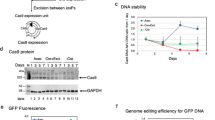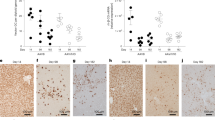Abstract
One strategy for improving selectivity of gene therapy is the use of a replication-activated adenovirus vector that mediates transgene expression specifically in tumor cells through homologous recombination of viral genomes. In this study, we compared replication-activated adenovirus containing inverted repeats (Ad.IR-BG) with IR-deficient virus (Ad.BG) for selective gene expression in hepatocellular carcinoma and colon carcinoma metastases in the liver. We found that Ad.IR-BG conferred specific gene expression in both carcinoma cells, with minimal expression in hepatocytes and colon epithelial cells. This occurred through viral DNA recombination in Ad.IR-BG-infected tumor cells but not in normal cells. Hydroxyurea, which blocks DNA replication, inhibited DNA recombination and β-gal expression in Ad.IR-BG-infected but not Ad.BG-infected tumor cells. Finally, systemic injection of Ad.IR-BG into tumor xenografts in nude mice significantly improved selectivity of gene expression in tumors with minimal expression in normal tissues. Viral DNA recombination, which was absent in normal liver, was detected in Ad.IR-BG-infected tumors but not in Ad.BG-infected tissue. These findings demonstrated that replication-activated adenovirus can mediate tumor-specific gene expression through viral DNA recombination, which is otherwise deficient in normal cells.
This is a preview of subscription content, access via your institution
Access options
Subscribe to this journal
Receive 12 print issues and online access
$259.00 per year
only $21.58 per issue
Buy this article
- Purchase on Springer Link
- Instant access to full article PDF
Prices may be subject to local taxes which are calculated during checkout





Similar content being viewed by others
References
O'Connell MJ, Nagorney DM, Bernath AM, et al. Sequential intrahepatic fluorodeoxyuridine and systemic fluorouracil plus leucovorin for the treatment of metastatic colorectal cancer confined to the liver. J Clin Oncol. 1998;16:2528–2533.
Harmantas A, Rotstein LE, Langer B . Regional versus systemic chemotherapy in the treatment of colorectal carcinoma metastatic to the liver: is there a survival difference? Meta-analysis of the published literature. Cancer (Phila). 1996;78:1639.
Tang ZY . Hepatocellular carcinoma — cause, treatment and metastasis. World J Gastroenterol. 2001;7:445–454.
Grill J, Van Beusechem VW, Curiel DT, Gerritsen WR . Combined targeting of adenoviruses to integrins and epidermal growth factor receptors increases gene transfer into primary glioma cells and spheroids. Clin Cancer Res. 2001;7:641–650.
Zhang M, Li SP, Nyati MK, et al. Regional delivery and selective expression of a high-activity yeast cytosine deaminase in an intrahepatic colon cancer model. Cancer Res. 2003;63:658–663.
Nayti MK, Sreekumar SP, Li SP, et al. High and selective expression of yeast cytosine deaminase under a carcinoembryonic antigen promoter-enhancer. Cancer Res. 2002;62:2337–2342.
Bischoff JR, Kirn DH, Williams A, et al. An adenovirus mutant that replicates selectively in p53-deficient human tumor cells. Science. 1996;274:373–376.
Johnson L, Shen A, Boyle L, et al. Selective replicating adenoviruses targeting deregulated E2F activity are potent, systemic antitumor agents. Cancer Cell. 2002;1:325–337.
Khuri FR, Nemunaitis J, Ganly I, et al. A controlled trial of intratumoral ONYX-015, a selectively-replicating adenovirus, in combination with cisplatin and 5-fluorouracil in patients with recurrent head and neck cancer. Nat Med. 2000;6:879–885.
Nemunaitis J, Cunningham C, Buchanan A, et al. Intravenous infusion of a replication-selective adenovirus (ONYX-015) in cancer patients: safety, feasibility and biological activity. Gene Therapy. 2001;8:746–759.
Steinwaerder DS, Carlson CA, Lieber A . DNA replication of first-generation adenovirus vectors in tumor cells. Hum Gene Ther. 2000;11:1933–1948.
Steinwaerder DS, Carlson CA, Lieber A . Generation of adenovirus vectors devoid of all viral genes by recombination between inverted repeats. J Virol. 1999;73:9303–9313.
Steinwaerder DS, Carlson CA, Otto DL, et al. Tumor-specific gene expression in hepatic metastases by a replication-activated adenovirus vector. Nat Med. 2001;7:240–243.
Bernt KM, Steinwaerder DS, Ni SH, et al. Enzyme-activated prodrug therapy enhances tumor-specific replication of adenovirus vectors. Cancer Res. 2002;62:6089–6098.
Rothmann T, Hengstermann A, Whitaker NJ, et al. Replication of ONYX-015, a potential anticancer adenovirus, is independent of p53 status in tumor cells. J Virol. 1998;72:9470–9478.
Hallenbeck PL, Chang YN, Hay C, et al. A novel tumor-specific replication-restricted adenoviral vector for gene therapy for hepatocellular carcinoma. Hum Gene Ther. 1999;10:1721–1733.
Li YH, Yu DC, Chen Y, et al. A hepatocellular carcinoma-specific adenovirus variant, CV890, eliminates distant human liver tumors in combination with doxorubicin. Cancer Res. 2001;61:6428–6436.
Matsubara S, Wada Y, Gardner TA, et al. A conditional replication-competent adenoviral vector, Ad-OC-E1a, to cotarget prostate cancer and bone stroma in an experimental model of androgen-independent prostate cancer bone metastasis. Cancer Res. 2001;61:6012–6019.
Nelson JE, Kay MA . Persistence of recombinant adenovirus in vivo is not dependent on vector DNA replication. J Virol. 1997;71:8902–8907.
Rae RS, Mehta PP, Chang CC, et al. Neoplastic phenotype of gap-junctional intercellular communication-deficient WB rat liver epithelial cells and its reversal by forced expression of connexin 32. Mol Carcinogen. 1998;22:120–127.
Freytag SO, Khil M, Stricker H, et al. Phase I study of replication-competent adenovirus-mediated double suicide gene therapy for the treatment of locally recurrent prostate cancer. Cancer Res. 2002;62:4968–4976.
Acknowledgements
We thank Mary Davis (Department of Radiation Oncology, University of Michigan) for reviewing this manuscript.
Author information
Authors and Affiliations
Corresponding author
Additional information
Supported by NIH grants CA80145, CA84117, Cancer Center Core Grant CA46592.
Rights and permissions
About this article
Cite this article
Huang, X., Lieber, A., Tang, Z. et al. Gene expression in intrahepatic tumors through DNA recombination by a replication-activated adenovirus vector. Cancer Gene Ther 11, 450–456 (2004). https://doi.org/10.1038/sj.cgt.7700719
Received:
Published:
Issue Date:
DOI: https://doi.org/10.1038/sj.cgt.7700719
Keywords
This article is cited by
-
Enhancement of CPT-11 antitumor activity by adenovirus-mediated expression of β–glucuronidase in tumors
Cancer Gene Therapy (2011)



